Visceral, Transplant and Thoracic Surgery
Research Focus
General Facts
Research
Selected Publications
Selected Funding, Collaboration
Keywords: Cancer, molecular oncology, transplantation, ischemia-reperfusion injury, machine perfusion, inflammation, transplantation biology, transplant immunology, intracellular signaling, mitochondria, reactive oxygen species (ROS), translational research, quality assurance in surgery
Research (ÖSTAT Classification) : 106023, 301114, 301904, 302003, 302082, 302083
Research Focus
Molecular and Clinical Oncology
Translational research focuses on altered intracellular signalling pathways and their tumourigenic effects, particularly in controlled clinical trials.
Organ Preservation, Transplantation and Inflammation
Experimental and clinical machine perfusion of organs together with biochemical assessment, functional imaging and bioenergetic investigation (organLifeTM laboratory) serve as a basis for the monitoring and treatment of organs during preservation and prior to transplantation.
Quality Assurance in Surgery
Based on the comprehensive, quality-controlled registry with third-party data control we advance the magnitude and quality of clinical studies and translational research.
General Facts
The Department of Visceral, Transplant and Thoracic Surgery (VTT) maintains an internationally established high-volume adult and paediatric transplant programme that covers all solid organs as well as vascularised composite allografts. The second focus is on oncology, in which we offer solutions for all types of tumours through abdominal, endocrine, breast as well as thoracic surgery. The high-volume cancer care with an international reputation is closely connected with corresponding research programmes and forms part of an auditable quality assurance programme as a third scientific focus. The assessment of molecular events in malignancy and the tumour environment is recognised through the career expertise of Univ.-Prof. Jakob Troppmair and his team in the DSL.
Daniel Swarovski Research Laboratory (DSL)
The Daniel Swarovski Research Laboratory (DSL) was established to add an equally ambitious research focus to the challenging and successful solid organ transplantation programme initiated by Prof. Raimund Margreiter. A common theme of projects in molecular transplantation biology and oncology is the role of intracellular signalling pathways, reactive oxygen species (ROS) and mitochondria in the development of pathological conditions but also as possible targets for therapeutic intervention.
organLifeTM Laboratory
The organLifeTM laboratory serves as a multidisciplinary research core unit for machine perfusion of all organs and as an assessment battery that allows in-depth analysis of organ viability, function and regeneration. Our primary objective is to establish long-term organ preservation.
Research
Research Focus: Oncology
Clinical Oncology
Team leaders: Univ.-Prof. Dr. Dietmar Öfner-Velano, Assoz. Prof. Priv.-Doz. Dr. Manuel Maglione, Assoz. Prof. Priv.-Doz. Dr. Alexander Perathoner, Priv.-Doz. Dr. Reinhold Kafka-Ritsch, Priv.-Doz.in Dr.in Pamela Kogler, Univ.-Prof. Dr. Stefan Schneeberger
Members of the oncology working group are significantly involved in the planning, development and implementation of national and international clinical studies, which comprise several phase-II and III studies. Further activities include of development of prognostic scores (ASPEN study, ASSO pNEN study group), which are validated by international centres. This area of research is rounded off with investigations into the metabolome and IL-37, for better understanding of the regeneration potential of the liver. Examples of academic studies include: DREAM study, European snapshot study, E-MIPS registry, Presepsin study, IOPSH study, SLASA and SOLE study.
Molecular Oncology
Team leaders: Univ. Prof. Dr. Jakob Troppmair, Assoz. Prof. Manuel Maglione, Assoz. Prof. Priv.-Doz. Dr. Florian Augustin, Priv.-Doz.in Dr.in Pamela Kogler, Dr.in Eva Braunwarth, Dr. Stefan Scheidl, Univ.-Prof. Dr. Stefan Schneeberger
Tissue Microarrays and Organoids
Tissue microarrays and organoids from a large cohort of pancreatic, lung and colorectal cancer samples serve as a basis upon which to gain insights into the molecular aspects of tumour development and progression in order to provide better characterisation of the tumour microenvironment (TILs in PDAC study). In cooperation with internal networks, investigations of genetic variations in the highly atherogenic apolipoprotein(a) or immunogenomic analyses in colorectal cancer serve as examples for additional projects conducted at MUI as well as for studies on transcription factors, adhesion molecules, cytokines and mitochondrial metabolic phenotyping.
Preventing Malignant Transformation and Regulation of Tumour Growth
Progress in cancer treatment is expected from improved treatment regimens and alternative targets are currently seen in metabolic alterations that allow tumour cells to adapt to increasing and changing needs. Understanding and therapeutic targeting of changes in the production of ROS are central to our work, as these are important for tumour survival and growth. Recent collaborative work aims to produce greater understanding of how BRAF inhibitors promote intermediate BRAF(V600E) conformations and binary interactions with activated RAS.
Initial Evidence of a Novel Tumour-Suppressor Pathway Comprising JNK, PKCß and p66Shc
Recent work in BRAFV600E-transformed melanoma cells demonstrated a defect in the activation of JNK1/2, which together with PKCß are required for p66Shc phosphorylation and ROS production. This may also explain the deficient ROS production previously reported by us in RAF-transformed cells. Given that the inactivation of JNK1/2 upstream kinases and PKCß has also been found in tumours, we postulate the existence of a possible novel tumour-suppressor pathway.
Tumour Immunomorphological Studies in Machine-Perfused Livers with Metastasis
Livers affected by metastasis of colorectal cancer will be perfused with blood for several days after curative resection in collaboration with the Department of Haemato-Oncology and the DSL. This will provide the unique opportunity to study single-cell tumour behaviour live and ultimately to test the efficacy of modification and treatment under human-like conditions. In this model, we will also assess RAF and MEK, ERK1/2, RKIP and miR-23a regulation and the effect of interference with these and other mechanisms in immuno-oncology.

Fig. 1: Prolonged preservation through machine perfusion allows the assessment of liver metastasis ex vivo. Modified (D. Öfner-Velano) from Schneeberger S., Nature 2018.
Research Focus: Organ Preservation, Transplantation and Inflammation
Leaders: Univ.-Prof. Dr. Stefan Schneeberger, Prof.in Priv. Doz.in Dr.in Annemarie Weissenbacher, Assoz. Prof. Priv.-Doz. Dr. Manuel Maglione, Assoz. Prof. Priv.-Doz. Dr. Rupert Oberhuber, Priv.-Doz.in Dr.in Theresa Hautz, Priv. Doz. Dr. Thomas Resch, Dr. Benno Cardini.
The focus both of clinical and experimental research is on improving the understanding and finding ways to prevent or ameliorate ischemia-reperfusion injury (IRI). Our clinical trials have shown a significant impact of IRI on transplantation outcome and they have identified the value and significance of real-time confocal microscopy (RTCM) and respirometry as tools to assess both damage prior to transplantation and outcome after transplantation.
IRI in VCA
We recently carried out the first in-depth analysis of tissue damage induced by IRI in rodent models and tested the effect of novel preservation solutions on the prevention of IRI. Muscle is the tissue that is most affected by I/R in vascularised composite graft. We found histomorphological signs of regeneration in the musculature, indicating natural regenerative potential in this model.
Preventing Ischaemia-Reperfusion Injury (IRI)
The production of ROS on initiation of reperfusion is responsible for many cellular events, ultimately resulting in the manifestation of IRI. In order to control excessive ROS production, our focus is on controlling p66Shc expression, for which we have dissected the signalling pathways that regulate activation. Our current emphasis is on comparison of JNK1/2 and PKCß in their relevance and contribution to the development of IRI through p66Shc-dependent and independent pathways. Most recently, we also have begun to include human material in our research and especially samples from long-term perfused organs.
Machine Perfusion Programme
Our aim is the targeted treatment of damaged organs, in order to restore functionality. Together with a comprehensive collection of technologies and instruments for in-depth analysis of tissue and perfusate composition, molecular biological morphology, viability and bioenergetic function, our setup is ideally suited both to the assessment of machine-perfused organs used in our clinical work and to experimental studies.

Fig. 2: Schematic diagram and structure of the multi-organ preservation and assessment programme.
Clinical Kidney Preservation and Machine Perfusion Trials
In a prospective clinical trial, kidney transplant recipients were investigated for the development of delayed graft function. A real-time confocal microscopy score was found to be significantly lower in kidneys developing delayed graft function (DGF) compared with no DGF (p=0.01), whereas at p = 0.13 the commonly used Remuzzi score did not differ between DGF and no DGF.
In a subsequent study, we assessed 103 hypothermic machine perfusion (HMP) and 103 SCS instances in a propensity score (PS) matched study. The DGF rate was 64.1% for SCS compared with 31.1% following HMP, which is equivalent to a 51.5% reduction in the DGF rate. DGF was associated with decreased 1 and 3-year graft survival (p = 0.001 and p = 0.008) or a 4.1-fold increased risk of graft failure (HR = 4.108; 95% CI: 1.336 – 12.631; p = 0.014). In summary, this study illustrated that HMP significantly reduces DGF in kidney transplantation.

Fig. 3: Real-time, live, confocal imaging of the cortical region of a glomerulus of a kidney. Following left renal ischaemia and reperfusion, fine-needle biopsies of murine kidneys were taken and incubated with the live stains Syto 16 (green), propidium iodide (PI, red) and wheat germ agglutinin (WGA, blue) staining all the nuclei, the nuclei of the dead cells and the tissue morphology. Images were acquired with a 40x water immersion objective. One representative example is shown, which consists of a z-stack of 25 planes with spacing of 1 μm.
Clinical Liver Preservation and Machine Perfusion Trials
We have conducted two large clinical I/R trials in liver transplantation, with the aims of establishing a rapid assessment tool for donor liver quality and investigating its predictive value for clinical use. For both RTCM and mitochondrial respiration, we found strong correlations with early allograft dysfunction after liver transplantation.
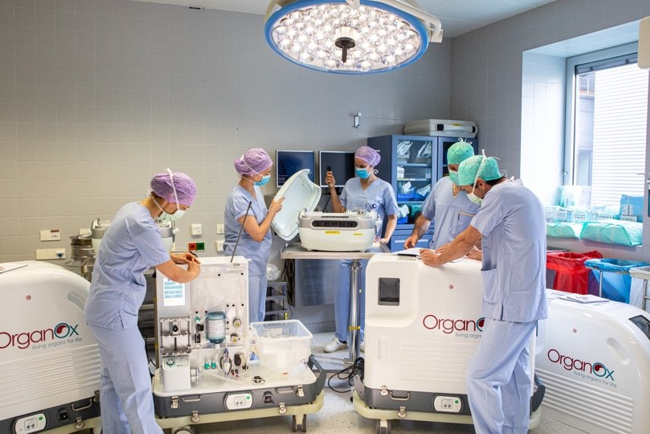
Fig. 4: A total of 7 preservation machines and a multidisciplinary team engage in the organ machine perfusion programme in the VTT.
In a comprehensive study, we analysed 50 livers during machine perfusion and transplantation. Although data analysis is ongoing, we can see clear dynamics during machine perfusion and strong correlations with the outcome.
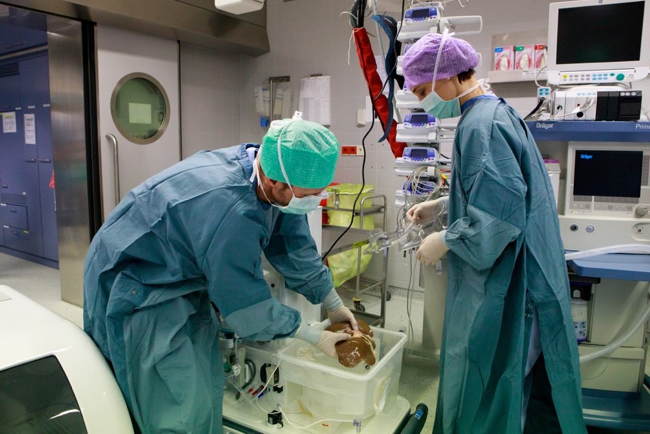
Fig. 5: Liver machine perfusion is established in practice. Approximately 50% of all livers are machine-perfused before transplantation.
Tetrahydrobiopterin in Experimental Organ Transplantation
Tetrahydrobiopterin is a naturally-occurring, potent antioxidative agent as well as an essential co-factor for a set of 8 different enzymes, including the three nitric oxide synthase (NOS) isoforms (neuronal, endothelial and inducible). The immunomodulatory properties of tetrahydrobiopterin were identified in experimental transplant models and in a brain death model in mice. The mechanisms are specific to tetrahydrobiopterin and not related to its antioxidative properties.
The target molecule of exogenous tetrahydrobiopterin in the prevention of acute rejection remains elusive. Currently funded projects focusing on acute rejection clearly describe a different immunoprotective mechanism in comparison with that of classic immunosuppressive agents, e.g. such as calcineurin inhibitors. Analyses of secondary lymphoid organs, serum and tissue specimens indicate strong manipulation of the innate immune response following organ transplantation, which in turn has a decisive influence on adaptive immune response.
Research Focus: Inflammation and Sepsis
Leader: Priv.-Doz. Dr. Reinhold Kafka-Ritsch, Assoz. Prof. Priv.-Doz. Dr. Alexander Perathoner, Dr.in Irmgard Kronberger
The main focus is on the development of new strategies for the treatment of abdominal sepsis. We have developed a damage control concept using abdominal vacuum therapy to treat abdominal sepsis in patients, which has been proved at least in an in-house controlled randomised trial. Our current focus of investigation is on the feasibility and side effects of bowel preparation and preoperative oral antibiotics. Studies of the micro and mycobiome are ongoing. HPV infection, complex anal fistulae and radiation proctitis represent focuses of the coloproctology group and are being evaluated in clinical trials (INSPIRE trial, MiFlaPro trial).
Research Focus: Quality Assurance in Surgery
Leader: Prof. Dr. Dietmar Öfner-Velano, MAS, MSc
Based on over 20 years of experience, a digital, proprietary, quality-assurance programme has been established, which provides quality-controlled, audit-ready data in routine clinical practice with no significant additional effort. Comprising more than 110,000 unique patient records, this registry-embedded clinical trial is a unique feature of the department and has already served as an indispensable quality-assured database for several retrospective studies, including diploma theses. The qcRegistry itself is also the object of research with respect to implementation in daily practice, user-friendliness and the effects on treatment pathways, to name but a few. In the near future, investigations will be conducted to examine how the plethora of data can be processed using machine learning. Recent surgical issues, for example, have been addressed in the global collaboration with GlobalSurg, especially with COVIDSurg using these data in 2020.
Selected Publications 2019-2020
- Berglund E, Andersen Ljungdahl M, Bogdanović D, Berglund D, Wadström J, Kowalski J, Brandacher G, Kamińska D, Kaufman CL, Talbot SG, Azari K, Landin L, Höhnke C, Dwyer KM, Cavadas PC, Thione A, Clarke B, Kay S, Wilks D, Iyer S, Iglesias M, Özkan Ö, Özkan Ö, Krapf J, Weissenbacher A, Petruzzo P, Schneeberger S. Clinical Significance of Alloantibodies in Hand Transplantation: A Multicenter Study. Transplantation. 2019 Oct;103(10):2173-82
- Braunwarth E, Primavesi F, Göbel G, Cardini B, Oberhuber R, Margreiter C, Maglione M, Schneeberger S, Öfner D, Stättner S. Is bile leakage after hepatic resection associated with impaired long-term survival? Eur J Surg Oncol. 2019 Jun;45(6):1077-83
- Caballero C , Burock S, Carrion-Alvarez L, Nilsson H, Ruers T, Senellart P, Rivoire M, Stättner S, Primavesi F, Troisi R, Gruenberger T, Heil J, Schnitzbauer AA, Rahbari NN, Swijnenburg RJ, Malik H, Protic M, Kataoka K, Mauer M, Ducreux M, Poston G, Evrard S. Building a collaboration to improve surgical research through EORTC/ESSO 1409-CLIMB study: A prospective liver metastasis database with an integrated quality assurance program. Eur J Surg Oncol. 2019 Oct;45(10):1870-75
- Cardini B, Fodor M, Hermann M, Wieser V, Hautz T, Mellitzer V, Schwelberger H, Resch T, Weißenbacher A, Margreiter C, Zelger B, Tilg H, Öfner D, Schneeberger S, Troppmair J, Maglione M, Oberhuber R. Live Confocal Imaging as a Novel Tool to Assess Liver Quality: Insights From a Murine Model. Transplantation. 2020 Dec;104(12):2528-37
- Cardini B, Oberhuber R, Fodor M, Hautz T, Margreiter C, Resch T, Scheidl S, Maglione M, Bösmüller C, Mair H, Frank M, Augustin F, Griesmacher A, Schennach H, Martini J, Breitkopf R, Eschertzhuber S, Pajk W, Obwegeser A, Tilg H, Watson C, Öfner D, Weissenbacher A, Schneeberger S. Clinical Implementation of Prolonged Liver Preservation and Monitoring Through Normothermic Machine Perfusion in Liver Transplantation. Transplantation. 2020 Sep;104(9):1917-28
- COVIDSurg Collaborative. Delaying surgery for patients with a previous SARS-CoV-2 infection. Br J Surg. 2020 Nov;107(12): e601- e602
- COVIDSurg Collaborative. Outcomes from elective colorectal cancer surgery during the SARS-CoV-2 pandemic. Colorectal Dis. 2020
- Esser H, Resch T, Pamminger M, Mutschlechner B, Troppmair J, Riedmann M, Gassner E, Maglione M, Margreiter C, Boesmüller C, Oberhuber R, Weissenbacher A, Cardini B, Finkenstedt A, Zoller H, Tilg H, Öfner D, Schneeberger S. Preoperative Assessment of Muscle Mass Using Computerized Tomography Scans to Predict Outcomes Following Orthotopic Liver Transplantation. Transplantation. 2019 Dec;103(12):2506-14
- Gasser E, Braunwarth E, Riedmann M, Cardini B, Fadinger N, Presl J, Klieser E, Ellmerer P, Dupré A, Imai K, Malik H, Baba H, Ulmer H, Schneeberger S, Öfner D, Dinnewitzer A, Stättner S, Primavesi F. Primary tumour location affects survival after resection of colorectal liver metastases: A two-institutional cohort study with international validation, systematic meta-analysis and a clinical risk score. F.PLoS One. 2019 May 31;14(5): e0217411
- Gasteiger S, Berchtold V, Bösmüller C, Dostal L, Ulmer H, Bogensperger C, Resch T, Rudnicki M, Neuwirt H, Oberhuber R, Cardini B, Scheidl S, Mayer G, Öfner D, Weissenbacher A, Schneeberger S. A Retrospective Propensity Score Matched Analysis Reveals Superiority of Hypothermic Machine Perfusion over Static Cold Storage in Deceased Donor Kidney Transplantation. J Clin Med. 2020 Jul 21;9(7):2311.
- Gasteiger S, Primavesi F, Göbel G, Braunwarth E, Cardini B, Maglione M, Sopper S, Öfner D, Stättner S. Early Post-Operative Pancreatitis and Systemic Inflammatory Response Assessed by Serum Lipase and IL-6 Predict Pancreatic Fistula. World J Surg. 2020 Dec;44(12):4236-44
- Gasteiger S, Primavesi F, Werkl P, Dostal L, Gehwolf P, Braunwarth E, Maglione M, Sopper S, Öfner D, Stättner S. The prognostic value of Presepsin for postoperative complications following pancreatic resection: A prospective study. PLoS One. 2020 Dec 9;15(12): e0243510
- Haldar D, Kern B, Hodson J, Armstrong MJ, Adam R, Berlakovich G, Fritz J, Feurstein B, Popp W, Karam V, Muiesan P, O'Grady J, Jamieson N, Wigmore SJ, Pirenne J, Malek-Hosseini SA, Hidalgo E, Tokat Y, Paul A, Pratschke J, Bartels M, Trunecka P, Settmacher U, Pinzani M, Duvoux C, Newsome PN, Schneeberger S; European Liver and Intestine Transplant Association (ELITA). Outcomes of liver transplantation for non-alcoholic steatohepatitis: A European Liver Transplant Registry study. J Hepatol. 2019 Aug;71(2):313-22
- Hatzl S, Perfler B, Wurm S, Uhl B, Quehenberger F, Ebner S, Troppmair J, Reinisch A, Wölfler A, Sill H, Zebisch A. Increased Expression of Micro-RNA-23a Mediates Chemoresistance to Cytarabine in Acute Myeloid Leukemia. Cancers (Basel). 2020 Feb 20;12(2):496
- Hautz T, Messner F, Weissenbacher A, Hackl H, Kumnig M, Ninkovic M, Berchtold V, Krapf J, Zelger BG, Zelger B, Wolfram D, Pierer G, Löscher WN, Zimmermann R, Gabl M, Arora R, Brandacher G, Margreiter R, Öfner D, Schneeberger S. Long-term outcome after hand and forearm transplantation - a retrospective study. Transpl Int. 2020 Sep 24;33(12):1762-78
- Jahn B, Sroczynski G, Bundo M, Mühlberger N, Puntscher S, Todorovic J, Rochau U, Oberaigner W, Koffijberg H, Fischer T, Schiller-Fruehwirth I, Öfner D, Renner F, Jonas M, Hackl M, Ferlitsch M, Siebert U; Austrian Colorectal Cancer Screening Model Group. Effectiveness, benefit harm and cost effectiveness of colorectal cancer screening in Austria. BMC Gastroenterol. 2019 Dec 5;19(1):209
- Kogler P, DeVries AF, Eisterer W, Thaler J, Sölkner L, Öfner D; TAKO 05/ABCSG R-02 Trial Investigators. Intensified preoperative chemoradiation by adding oxaliplatin in locally advanced, primary operable (cT3NxM0) rectal cancer: Impact on long-term outcome. Results of the phase II TAKO 05/ABCSG R‑02 trial. Strahlenther Onkol. 2018 Jan;194(1):41-9
- Kafka-Ritsch R, Zitt M, Perathoner A, Gasser E, Kaufman C, Czipin S, Aigner F, Öfner D. Prospectively Randomized Controlled Trial on Damage Control Surgery for Perforated Diverticulitis with Generalized Peritonitis. World J Surg. 2020 Dec;44(12):4098-4105
- Latenstein AEJ, Scholten L, Al-Saffar HA, Björnsson B, Butturini G, Capretti G, Chatzizacharias NA, Dervenis C, Frigerio I, Gallagher TK, Gasteiger S, Halimi A, Labori KJ, Montagnini G, Muñoz-Bellvis L, Nappo G, Nikov A, Pando E, de Pastena M, de la Peña-Moral JM, Radenkovic D, Roberts KJ, Salvia R, Sanchez-Bueno F, Scandavini C, Serradilla-Martin M, Stättner S, Tomazic A, Varga M, Zavrtanik H, Zerbi A, Erkan M, Kleeff J, Lesurtel M, Besselink MG, Ramia-Angel JM; Scientific, Research Committee of the European-African Hepato-Pancreato-Biliary Association (E-AHPBA). Clinical Outcomes after Total Pancreatectomy: A Prospective Multicenter Pan-European Snapshot Study. Ann Surg. 2020 Nov
- Mayrhofer JE, Enzler F, Feichtner A, Röck R, Fleischmann J, Raffeiner A,Tschaikner P, Ogris E, Huber RG, Hartl M, Schneider R, Troppmair J, Torres-Quesada O, Stefan E. Mutation-oriented profiling of autoinhibitory kinase conformations predicts RAF inhibitor efficacies. Proc Natl Acad Sci U S A. 2020. Dec 8;117(49):31105-13
- Messner F, Fischer AC, Runggaldier E, Sprung S, Müller J, Eiter S, Gantschnigg A, Zelger B, Zelger B, Wolfram D, Öfner D, Hautz T, Schneeberger S. Mechanical Irritation in Vascularized Composite Tissue Allotransplantation Triggers Localized Skin Rejection. Transplantation. 2020 May;104(5):956-69
- Oh BC, Furtmüller GJ, Fryer ML, Guo Y, Messner F, Krapf J, Schneeberger S, Cooney DS, Lee WPA, Raimondi G, Brandacher G. Vascularized composite allotransplantation combined with costimulation blockade induces mixed chimerism and reveals intrinsic tolerogenic potential. JCI Insight. 2020 Apr 9;5(7): e128560
- Piringer G, Gruenberger T, Kuehrer I, Öfner D, Kaczirek K, Längle Friedrich, Viragos-Toth IL, Amann A, Eisterer W, Függer R, Andel J, Pichler A, Stift J, Sölkner L, Gnant MX, Thaler J. LM02-trial perioperative treatment with panitumumab and FOLFIRI in patients with wild-type RAS, potentially resectable colorectal cancer liver metastases. Journal of Clinical Oncology 38 (sup15)
- Primavesi F, Andreasi V, Hoogwater FJH, Partelli S, Wiese D, Heidsma C, Cardini B, Klieser E, Marsoner K, Fröschl U, Thalhammer S, Fischer I, Göbel G, Hauer A, Kiesslich T, Ellmerer P, Klug R, Neureiter D, Wundsam H, Sellner F, Kornprat P, Függer R, Öfner D, Nieveen van Dijkum EJM, Bartsch DK, de Kleine RHJ, Falconi M, Stättner S. A Preoperative Clinical Risk Score Including C-Reactive Protein Predicts Histological Tumor Characteristics and Patient Survival after Surgery for Sporadic Non-Functional Pancreatic Neuroendocrine Neoplasms: An International Multicenter Cohort Study. Cancers 2020 May 14;12(5):1235
- Primavesi F, Stättner S, Jäger T, Göbel G, Presl J, Tomanová K, Buchner S, Maglione M, Resch T, Hutter J, Öfner D, Dinnewitzer A. Progressive Oncological Surgery Is Associated with Increased Curative Resection Rates and Improved Survival in Metastatic Colorectal Cancer. Cancers (Basel). 2019 Feb 14;11(2):218
- Primavesi F, Fadinger N, Biggel S, Braunwarth E, Gasser E, Sprung S, Göbel G, Gassner E, Stättner S, Öfner D. Early response evaluation during preoperative chemotherapy for colorectal liver metastases: Combined size and morphology-based criteria predict pathological response and survival after resection. J Surg Oncol. 2019 Dec 1;121(2):382-91
- Primavesi F, Klieser E, Cardini B, Marsoner K, Fröschl U, Thalhammer S, Fischer I, Hauer A, Urbas R, Kiesslich T, Neureiter D, Zitt M, Klug R, Wundsam H, Sellner F, Karner J, Függer R, Cakar-Beck F, Kornprat P, Öfner D, Stättner S; ASSO pNEN Study Group. Exploring the surgical landscape of pancreatic neuroendocrine neoplasia in Austria: Results from the ASSO pNEN study group. Eur J Surg Oncol. 2019 Feb;45(2):198-206
- Röck R, Mayrhofer JE, Torres-Quesada O, Enzler F, Raffeiner A, Raffeiner P, Feichtner A, Huber RG, Koide S, Taylor SS, Troppmair J, Stefan E. BRAF inhibitors promote intermediate BRAF(V600E) conformations and binary interactions with activated RAS. Sci Adv. 2019 Aug 14;5(8): eaav8463
- Weissenbacher A, Oberhuber R, Hermann M, Soleiman A, Ulmer H, Mayer G, Margreiter C, Maglione M, Bösmüller C, Messner F, Resch T, Cardini B, Troppmair J, Margreiter R, Öfner D, Schneeberger S. Live Confocal Tissue Assessment With SYTO16/PI and WGA Staining Visualizes Acute Organ Damage and Predicts Delayed Graft Function in Kidney Transplantation. Ann Surg. 2019 Nov;270(5):915-22
- Scandavini C, Serradilla-Martin M, Stättner S, Tomazic A, Varga M, Zavrtanik H, Zerbi A, Erkan M, Kleeff J, Lesurtel M, Besselink MG, Ramia-Angel JM; Scientific, Research Committee of the European-African Hepato-Pancreato-Biliary Association (E-AHPBA). Clinical Outcomes after Total Pancreatectomy: A Prospective Multicenter Pan-European Snapshot Study. Ann Surg. 2020
- Schneeberger S, Petruzzo P, Morelon E, Hautz T, Kanitakis J, Weissenbacher A, Messner F, Bernardon L, Seulin C, Berchtold V, Ninkovic M, Öfner D, Badet L 20-Year Follow-up of Two Cases of Bilateral Hand Transplantation. N Engl J Med ; 383(18): 1791-1792, 2020 10 29.
- Resch T, Cardini B, Oberhuber R, Weissenbacher A, Dumfarth J, Krapf C, Boesmueller C, Öfner D, Grimm M, Schneeberger S. Transplanting Marginal Organs in the Era of Modern Machine Perfusion and Advanced Organ Monitoring. Front Immunol. 2020 May 12;11:631
Selection of Funding
- FWF Project I 5177-B Mitochondrial dysfunction in ACM pathogenesis. (Jakob Troppmair)
- EU funded Project Interreg INCardio (Manuel Maglione, Jakob Troppmair)
- In Memoriam Dr. Gabriel Salzner Privatstiftung: P001 Normothermic Liver Preservation and Conditioning Trial. (Stefan Schneeberger)
- MUI Start: 2018-10-009 Detection of markers for liver function and regeneration during liver perfusion using the OrganOx metra® device. (Annemarie Weissenbacher)
- TWF: UNI-0404/Role of donor-derived leukocytes in perfusate during machine perfusion of human liver allografts. 2360 (Theresa Hautz-Neunteufel)
- ÖNB 17287Assessment of the liver quality prior to trans-plantation by life confocal imaging and cytokine expression profiling. (Rupert Oberhuber)
Collaborations
- Peter J. Friend, Rutger Ploegh, University of Oxford, Nuffield Department of Surgical Sciences, Oxford, United Kingdom
- Keith M. Channon, University of Oxford, Division of Cardiovascular Medicine, Radcliffe Department of Medicine, Wellcome Trust Centre for Human Genetics, Oxford, United Kingdom
- Darius Mirza, University Hospitals Birmingham, Liver and Hepato-Pancreato-Biliary (HPB) Unit, Birmingham, United Kingdom
- Gerald Brandacher, Johns Hopkins Medical University, Department of Plastic Surgery, Baltimore, USA
- Hans Schlitt, Universitätsklinikum Regensburg, Klinik und Poliklinik für Chirurgie, Regensburg, Germany
- Stuart Forbes, Institute for Regeneration and Repair, Center for Regenerative Medicine, University of Edinburgh, Scottland
- Kurt Werner Schmid, Universitätsklinikum Essen, Institut für Pathologie, Essen, Germany
- Emmanuel Morelon, Hospices Civils de Lyon, Hospital Edouard Herriot - Transplantation, néphrologie et immunologie, Lyon, France
- Emmanouil S. Papadakis, Graham Packham, Ramsey Cutress, Cancer Research UK Centre, Cancer Sciences Division, University of Southampton Faculty of Medicine, Southampton General Hospital, Southampton, United Kingdom
- Andrew Cato, Karlsruhe Institute of Technology, Institute of Photon and Synchrotron Radiation, Eggenstein-Leopoldshafen, Germany
- Armin Zebisch, Heinz Sill, Division of Hematology, Medical University of Graz, Graz, Austria
- Stefan Wiese, Faculty for Biology and Biotechnology, Group for Molecular Cell Biology, Ruhr University Bochum, Bochum, Germany
- Eduard Stefan, Institute of Biochemistry and Center for Molecular Biosciences, University of Innsbruck, Innsbruck, Austria
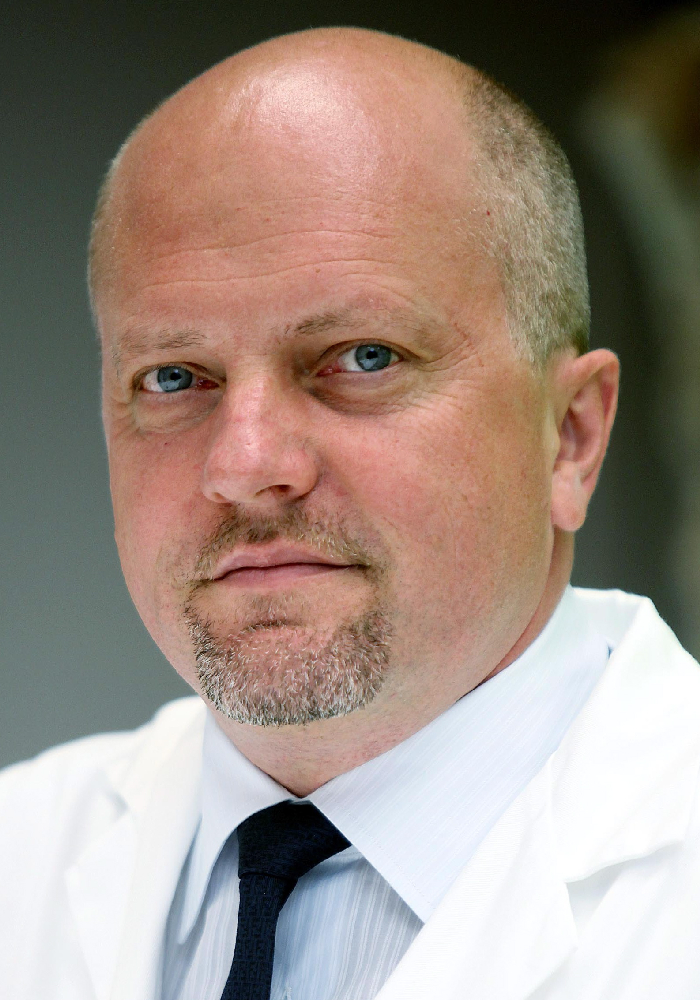 Univ.-Prof. Dr. med. Dietmar Öfner-Velano, MAS, MSc, F.A.C.S.
Univ.-Prof. Dr. med. Dietmar Öfner-Velano, MAS, MSc, F.A.C.S.
Director
Contact:
Anichstraße 35
6020 Innsbruck
Austria
Email: dietmar.oefner@i-med.ac.at
Phone: +43 512 504 22600
Fax: +43 512 504 22602
https://www.chirurgie-innsbruck.at
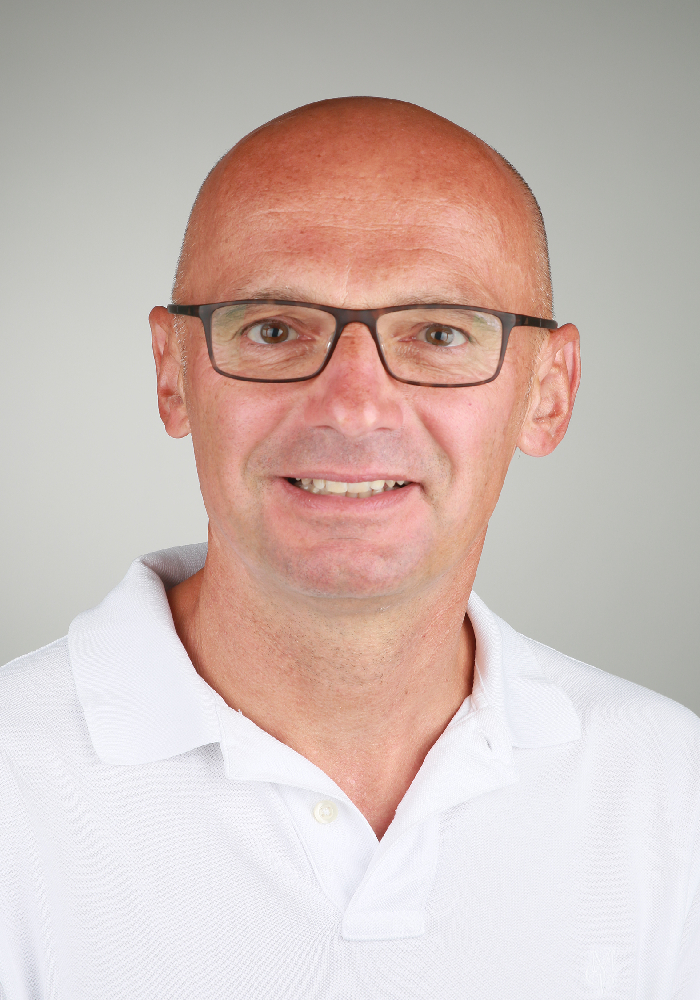 Univ.-Prof. Mag. Dr.rer.nat. Jakob Troppmair
Univ.-Prof. Mag. Dr.rer.nat. Jakob Troppmair
Research Unit Daniel Swarovski Research Laboratory
Head of Research Unit
Contact:
Innrain 66/6th floor
6020 Innsbruck
Austria
Email: jakob.troppmair@i-med.ac.at
Phone: +43 512 504 27819
Fax: +43 512 504 24625
https://www.i-med.ac.at/tx-research/
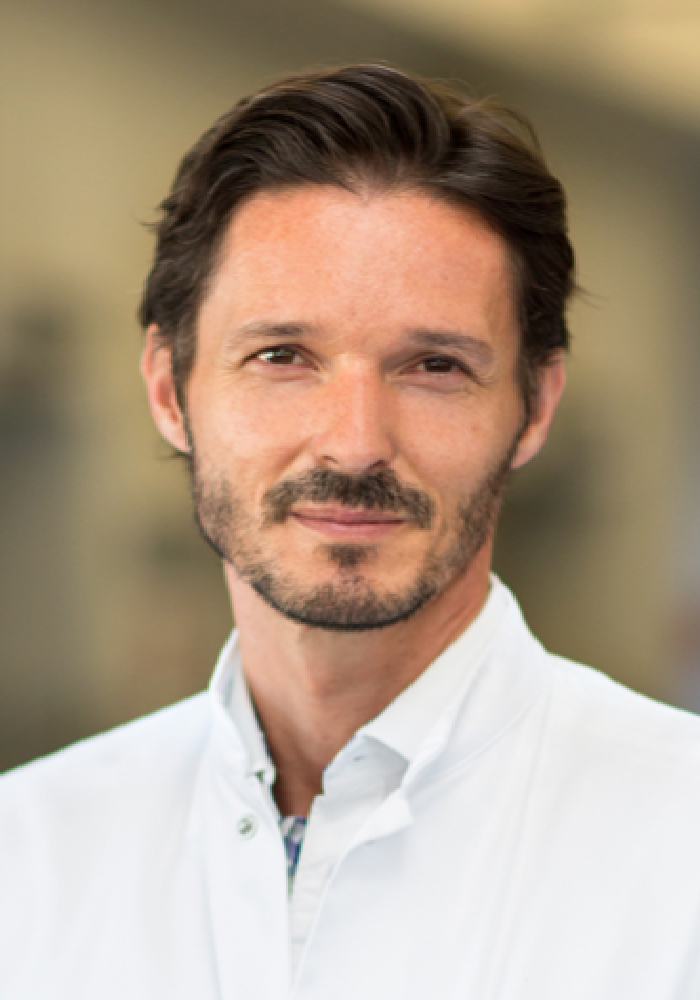 Univ.-Prof. Dr.med. Stefan Schneeberger, MBA, F.A.C.S
Univ.-Prof. Dr.med. Stefan Schneeberger, MBA, F.A.C.S
Research Unit organLifeTM Laboratory
Head of Research Unit
Contact:
Anichstrasse 35
6020 Innsbruck
Austria
Email: stefan.schneeberger@i-med.ac.at
Phone: +43 512 504 22604
Fax: +43 512 504 24625
https://www.i-med.ac.at/organlife/



